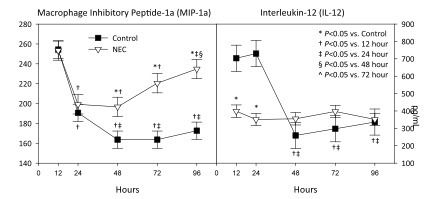|
|
Back to 2015 Annual Meeting Program Unexpected Macrophage Activity Might Alter the Inflammatory Process in Necrotizing Enterocolitis Jessica Raque*, Jessica Shepherd, Paul J. Matheson, Jason Smith, Cynthia Downard Surgery, University of Louisville, Louisville, KY
Purpose: The pathophysiology of necrotizing enterocolitis (NEC) is not well understood. Macrophages might play a role in clearing bacteria from the gut in the initial stages of NEC. Macrophage Inhibitory Peptide 1α (MIP-1α) is a cytokine produced by T-cells that works to inhibit macrophage chemotaxis and activation. Interleukin12 (IL-12) is a pro-inflammatory chemotactant produced primarily by macrophages. We hypothesized that the pro-inflammatory state associated with NEC pathophysiology would inhibit MIP-1α expression and induce IL-12 expression in serum. Back to 2015 Annual Meeting Program |
|||||||||
© 2026 Society for Surgery of the Alimentary Tract. All Rights Reserved. Read the Privacy Policy.


